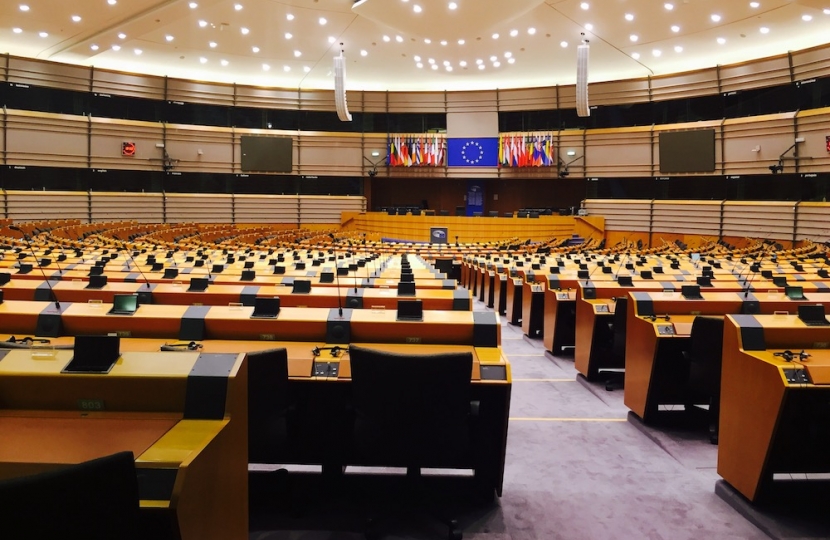
Some people have asked why I have rarely written an Issues Briefing on Brexit. There are so many aspects to it that it would be near impossible to produce this as one document and there are anyway many good factual (and independent) briefings produced by the House of Commons Library to which I have directed people on many occasions and again included a link below.
My own position on Brexit has not changed. I campaigned to remain in the EU; I voted to remain in the EU. However, in the result of the Referendum I was on the losing side of the argument. The task now is to get the best deal that we can for the country. What I am after is neither a so-called hard or soft Brexit but a fair Brexit.
THE RECENT DEBATES ON THE EU WITHDRAWAL BILL
In recent weeks I have received some emails on the debate on the Lords Amendments to the EU Withdrawal Bill. I received emails from both sides asking me to take contrary action and essentially, what these emails were saying was "I am damned if I do and damned if I don't" take a particular view on Brexit. Yet, as the Speaker of the House of Commons made clear, all I can do is follow my conscience on these issues in the full knowledge that I am a representative and not a delegate.
The situation with any Bill is that the position in Parliament is a dynamic one and not a static one. Bills are not put forward on a take it or leave it basis. They are the subject of discussion, debate and most importantly compromise wherever possible. Ministers indicate future changes as well as accept or reject official amendments. The EU Withdrawal Bill is no different. It is not a black or white position and the refinement continues.
What we have been discussing is the EU (Withdrawal) Bill. We have not been taking a second bite at Article 50 and whether the UK should leave the EU. The decision to enact Article 50 which starts the withdrawal proceedings was passed in the House of Commons by 494 to 122 – an overwhelming majority. I share the view that the House of Lords has exceeded its constitutional role in putting forward so many amendments that go beyond the terms of this Bill.
Membership of the EEA, the Customs Union and the Single Market were all defeated as Lords Amendments. In none of these cases did I believe that they were compatible with the decision reached in the Referendum and did not sit well side by side with our exit from the EU. The issue of a meaningful vote has become a fractious one since some are accusing the Prime Minister of going back on an agreement reached with Conservative rebels, although it has now been admitted that no such agreement was in fact reached. Personally, I thought we already had a meaningful vote on this issue and were well placed to hold the Government to account. I will look at any future amendments put forward on this subject but I would not underestimate the constitutional implications of what it is trying to achieve. See the House of Commons Library Briefing on this. https://commonslibrary.parliament.uk/brexit/legislation/parliaments-rig…
THE COUNCIL OF EUROPE
There is an alternative to the EU already in place and that is the Council of Europe. It is the organisation which has kept the peace in Europe since the end of the Second World War. It is the institution which initiated the Convention on Human Rights which remains the principle treaty on the subject. It is the premier human rights organisation in Europe and looks after the European Court of Human Rights, which is not an EU body but in front of which we have a success rate of well over 90%. It has 47 member countries and was the inspiration in 1949 of the UK amongst others. The work of the Council of Europe already affects a large number of different departments within Government. Clearly, it affects the Foreign Office since it covers so many aspects of foreign policy including whether individual countries meet their Council of Europe obligations and whether democracy can be enhanced in Turkey.
It also covers the work of the Home Office particularly in relation to terrorism and security including the consequences of war in various countries and modern slavery. The Council provides the international framework for discussing issues related to security and terrorism and has produced the Convention on the Prevention of Terrorism which we signed in 2005. This has included criticism by me of the Government of Belgium for not taking action in advance of the terrorist attack at Brussels airport. It covers cultural and related historic activities including football and sports governance. It covers a number of environmental considerations such as the effect of climate change on tidal lagoons and air quality. It covers the Treasury since we have discussed basic citizenship incomes. These are just some of the areas of British Government it touches. The Council of Europe has no legislative ability in itself and its recommendations are just that. Across much of mainland Europe there is a wish not to be on the wrong side of the Council of Europe. It does have the ability to share best practices and ensure that there is a maximum of co-ordination. It is however in the field of human rights that there is a particular focus for our post-Brexit involvement in Europe.
Most importantly, the Council also participates in essential work to increase democracy by monitoring elections. For example we will be participating in the monitoring of the Turkish General Election. It is also producing guidelines for the conduct of referenda. Above all, the Council offers all this in a way which enhances our sovereignty and shows our willingness to share in areas where we benefit from international co-operation. There are no statutory implications for the UK or on our ability to enhance the need for best practice and co-operation.
REVISITING THE REFERENDUM
Some of the emails I received have unashamedly asked me to block or frustrate Brexit. I simply will not do this. To do so would fly in the face of a referendum result which was clear and which both the Conservative and Labour Parties agreed in their manifestos to carry through to fruition. To go back on this would be a betrayal of a democratic decision and I do not believe that that would be in the country's interests.
So it is unhelpful to try to argue that I should vote a certain way in order 'to satisfy the expressed wish of my constituents in the referendum.' The referendum was a national vote and not one based on constituencies where the figures are estimated figures based on a statistical model. The vote was not counted on a constituency basis.
A number of emails have tried to say that this decision was obtained on the basis of lies by the Leave campaign alone without a reference to the lies of the Remain campaign in what was widely described as Project Fear. This also fails to acknowledge that these lies continue on both sides of the argument today; witness the heavy distortions of what MPs have said by Remain leaflets. It fails too to acknowledge that the odour of sanctity surrounding the Liberal-Democrats is now well and truly compromised. It was the Liberal Democrat Party which was fined £17,000 by the Electoral Commission after the party breached campaign finance rules relating to the EU Referendum. The Party failed to submit a complete and accurate spending return. As The Daily Telegraph pointed out the fine is only slightly shy of the £20,000 maximum which can be levied. In addition, the Open Britain campaign was also fined for an incorrect spending return linked to the Referendum. Similar fining of the Leave campaign has already been documented.
A PARTY POLITICAL ISSUE?
Those who ask me to dispense with party interests in the national interest ignore the fact that what is in the national interest is itself a party political issue and that different parties take different views. And yet, as I have already mentioned, the Conservative Party and the Labour Party are united in respecting the result of the Referendum. What we are seeing now is less about Party politics and more about Leave or Remain with underlying political advantage being grabbed wherever it can.
I understand the passion felt by those who want to remain in the EU. As I have said, this is the view that I took as well during the Referendum Campaign - although I fully admit that the EU requires fundamental reform which we are unlikely now to see. But we have to admit that we lost the vote. It is no use saying that opinion polls show people are changing their minds. Surely, the last General Elections have taught us that opinion polls are massively unreliable and are not an equivalent to a referendum or a general election. Moreover, the polls do not show a clear and massive swing for the Remain campaign anyway.
People try to tell me that Theresa May is heading for the hardest Brexit of all, but with no explanation of what this derogatory term means and in the face of an acknowledgement from her that there should be a customs arrangement with the EU. Other emails have spoken of negotiations being gridlocked. I simply cannot see that in the state of our negotiations, or at least I cannot see anything unusual about the state of the negotiations with the EU that is at all different from the negotiations I conducted in the private sector. The only thing that is different is a somewhat malign interest from the press and media. On the subject of a second referendum, frankly I do not like the idea. I do not believe it will help the situation by making a second referendum less divisive. We are going to see the same arguments raised again. We are going to see the same level of acrimony; the same willingness to use the law at every opportunity; and the same request for whoever loses to take their views into account. I am conscious of the statement made by the Archbishop of Canterbury who said that a second referendum on the final Brexit deal would be "unwise" and "not democratic".
THE BREXIT HUB
For those who would like to get non-partisan briefings on Brexit the House of Commons Library has set up a section on its website. This link takes you to the opening page https://www.parliament.uk/business/publications/research/eu-referendum/

